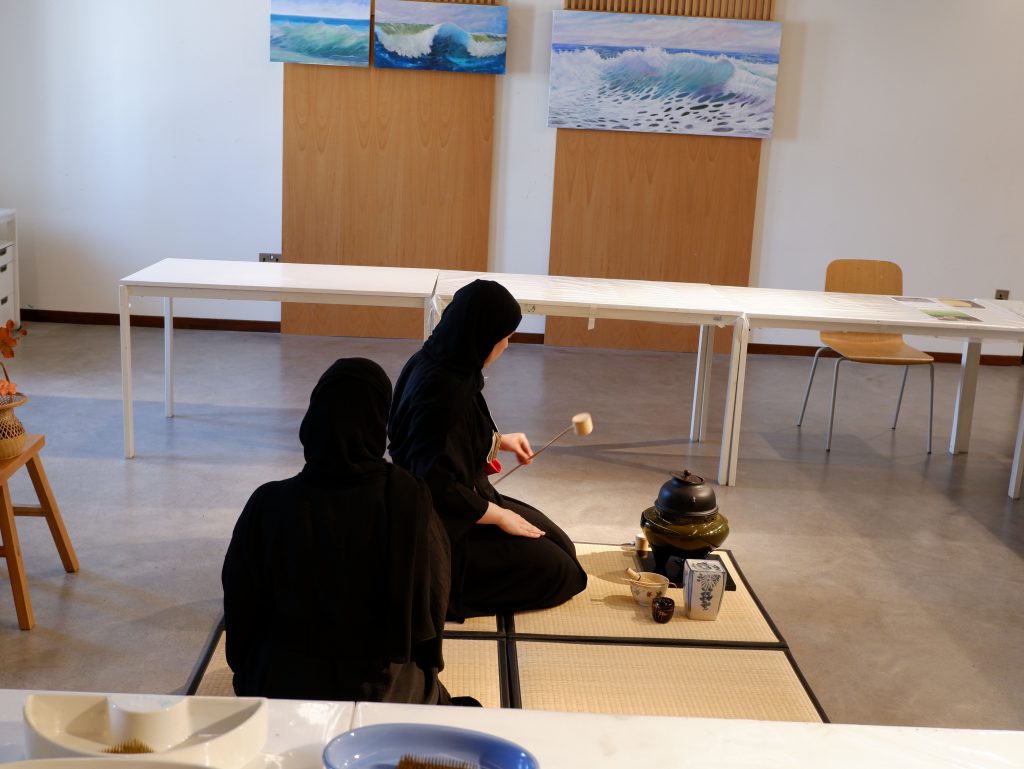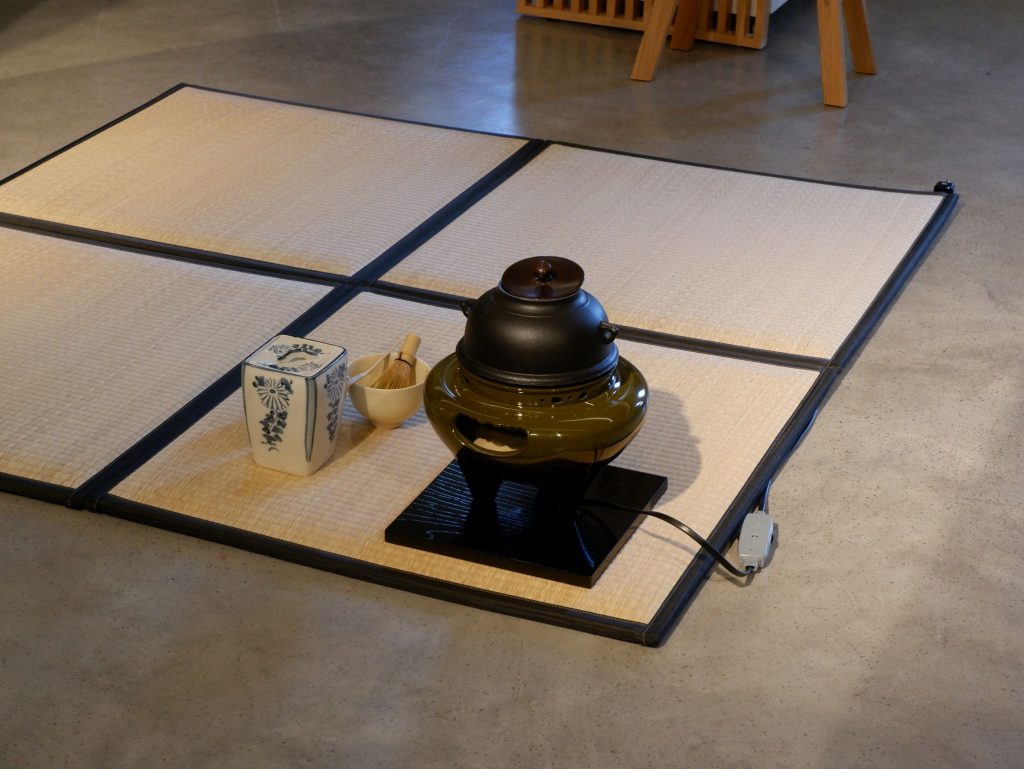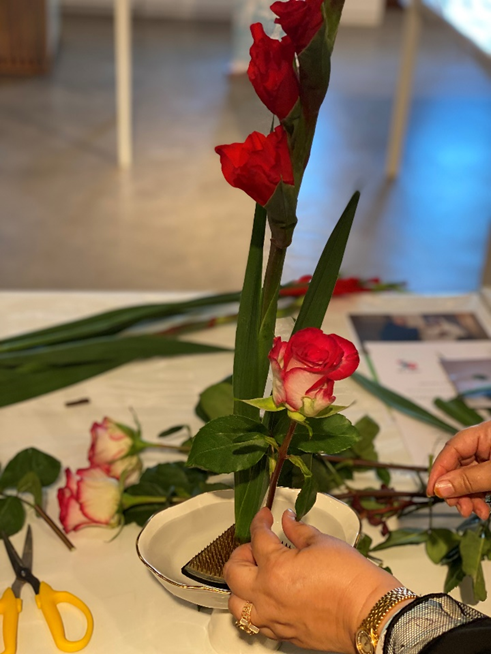





Amin Abbas
ABU DHABI: The Urasenke Tea Group – Abu Dhabi and the Ohara School of Ikebana – UAE Class presented a joint cultural workshop to teach the Japanese tea rituals “Chado” and the Japanese flower arrangement “Kado” or Ikebana at the Cultural Foundation this month.
This was the first time the workshop was presented in Arabic by Emirati students who are passionate about Japanese culture and who have studied these ancient arts for years. This workshop was organized in celebration of the 50th anniversary of the establishment of diplomatic relations between the UAE and Japan.
The method of tea or “chado”, where “cha” means tea and “do” means way, has its roots in the sixteenth century. The latter is based on four principles, which are “wa” harmony, “kei” respect, “sei” purity, and “jaku” tranquility. These principles are not applied only with the guest and the host, but with everything that surrounds the Japanese tea-serving room, including tools and purposes, and even the sound of boiling water in the “kama”, which is the pot of boiling water. The tea method, or Chado, as it is called in Japanese, takes its residents to a world far from the formalities and manifestations of external life. And it brings them to a world full of harmony and serenity, where life hurdles are almost fading away.
Ikebana, or the Japanese art of flower arranging, dates back 600 years and focuses on simplicity, asymmetrical beauty, and seasonal elements. Ikebana is distinguished from other arts related to flower arrangements around the world by its interest in the aesthetics of free space.
The workshop witnessed the presence and active participation of 7 Emirati women.
The workshop started with the Chado team, where the history of the Urasenke school, the Chado, and the Abu Dhabi Urasenke group were introduced. After that, Faiza Al-Mubaraki and Fatima Al-Suwaidi presented one of the several ways of serving tea called “Usucha Hakobi”, where Faiza Al-Mubaraki was the host and Fatima Al-Suwaidi was the guest. After a harmonious flow between boiling water, cleaning the tea utensils, and serving tea to the guest, the procedure ended. To include the guests in the workshop, Fatima Al-Suwaidi explained the “Bonryaku” procedure in details, and during her explanation, the guests followed the steps under the supervision of Faiza Al-Mubaraki, Salama Al-Rumaithi, and Laila Al-Nuaimi. The Chado team was amazed at the extent to which the guests were in harmony with the steps of preparing the tea in the “Bunryaku” procedure, as calmness spread all around. The tea preparation was almost over and the guests started mixing matcha powder with hot water. The guests finished preparing the tea and the color of the tea and the foam on top of it was something that pleased our hearts.
The second part of the workshop was devoted to the art of flower arrangement, Ikebana. Where the attendees learned about the history of Ikebana and its origins derived from the philosophy of Zen. The most important features of ikebana arrangements were introduced to the audience, which makes ikebana unique from the conventional arrangements. Rising form, an arrangement technique learned in the curriculum of the Ohara School of Ikebana, where flowers are arranged to highlight the beauty of the length of the branches by following some geometric rules. The attendees made their own arrangements following the same rules however they were surprised to see how the results differed in a way that reflects the personality of each participant.
The Japanese Ambassador to the UAE, ISOMATA Akio and his spouse, attended the workshop. The ambassador delivered a welcoming speech and praised the efforts exerted in organizing the first workshop of its kind, which contributes to strengthening ties between the UAE and Japan by establishing a cultural dialogue between the two countries.
Faiza Al-Mubaraki and Fatima Al-Suwaidi said about the workshop: “We were very happy when we were chosen for the first time by the Urasenke school to be the faces of chado at this event as two students interested in Japanese culture in general and the way of Japanese tea in particular. It was not easy, as we have all the respect and appreciation for Chado; but under the supervision of our teachers and with continuous hard work, we have achieved this. We will always strive to be part of strengthening Emirati-Japanese relations in one way or another. We thank the Urasenke school, for their trust in us.”
“We are also extending our gratitude to His Excellency Ambassador Isomata for attending the workshop and event, and for his constant support for the Emirati youth interested in Japanese culture.”
The Urasenke school was founded by “Rikyu Sen” during the sixteenth century, and the latter is considered the spiritual father of all chado admirers and scholars. “Rikyu Sen” built the creative and impressive foundations for the way of Japanese tea and its methods of preparation, followed by his disciples and grandchildren to convey to us what we learn today. The current grandson, who is the Grand Master of Urasenke “Soshitsu-sen”, was the one who began to spread the Chado culture around the world and now there are many schools all over the world, and among these schools, the Urasenke school in Abu Dhabi, which was a gift from the Grand Master “Soshitsu-sen” in 2009 to the Crown Prince then “Sheikh Mohammed bin Zayed” and the current president of the United Arab Emirates.
The Ohara School was founded by UnOhara in the late 19th century when Japan was opening up to the Western world. Onshin created the Moribana scene, which is the defining expression of the Ohara school. He designed the shallow, wide container most suitable for moribana arrangements. Moribana, which are arranged in low, wide containers, and hika, which are created in tall cylindrical vases, are the two primary methods of flower arrangement in the Ohara school.
Today, the school continues to thrive under the direction of the current and fifth principal, Hiroki Ohara. The Ohara School has offices in Tokyo and Osaka with 144 chapters in Japan and over 134 international classes and study groups with more than 300,000 members worldwide.